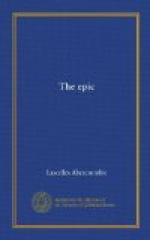The usual attempts at stricter definition of epic than anything this chapter contains, are either, in spite of what they try for, so vague that they would admit almost any long stretch of narrative poetry; or else they are based on the accidents or devices of epic art; and in that case they are apt to exclude work which is essentially epic because something inessential is lacking. It has, for instance, been seriously debated, whether an epic should not contain a catalogue of heroes. Other things, which epics have been required to contain, besides much that is not worth mentioning,[5] are a descent into hell and some supernatural machinery. Both of these are obviously devices for enlarging the scope of the action. The notion of a visit to the ghosts has fascinated many poets, and Dante elaborated this Homeric device into the main scheme of the greatest of non-epical poems, as Milton elaborated the other Homeric device into the main scheme of the greatest of literary epics. But a visit to the ghosts is, of course, like games or single combat or a set debate, merely an incident which may or may not be useful. Supernatural machinery, however, is worth some short discussion here, though it must be alluded to further in the sequel. The first and obvious thing to remark is, that an unquestionably epic effect can be given without any supernatural machinery at all. The poet of Beowulf has no need of it, for instance. A Christian redactor has worked over the poem, with more piety than skill; he can always be detected, and his clumsy little interjections have nothing to do with the general tenour of the poem. The human world ends off, as it were, precipitously; and beyond there is an endless, impracticable abyss in which dwells the secret governance of things, an unknowable and implacable fate—“Wyrd”—neither malign nor benevolent, but simply inscrutable. The peculiar cast of noble and desolate courage which this bleak conception gives to the poem is perhaps unique among the epics.
But very few epic poets have ventured to do without supernatural machinery of some sort. And it is plain that it must greatly assist the epic purpose to surround the action with immortals who are not only interested spectators of the event, but are deeply implicated in it; nothing could more certainly liberate, or at least more appropriately decorate, the significant force of the subject. We may leave Milton out, for there can be no question about Paradise Lost here; the significance of the subject is not only liberated by, it entirely exists in, the supernatural machinery. But with the other epic poets, we should certainly expect them to ask us for our belief in their immortals. That, however, is just what they seem curiously careless of doing. The immortals are there, they are the occasion of splendid poetry; they do what they are intended to do—they declare, namely, by their speech and their action, the importance to the world of what is going on in the poem.




